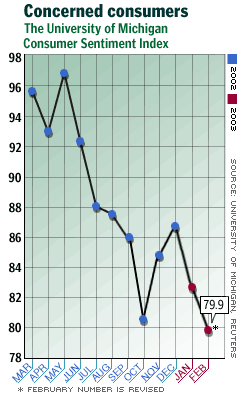NEW YORK (CNN/Money) - A closely watched measure of consumer confidence in the United States in February was revised upward, a published report said Friday, though it remained at the lowest level in more than nine years.
The University of Michigan's consumer sentiment index was revised upward to 79.9 from an initial reading of 79.2, according to a Reuters report. Economists, on average, expected a reading of 79.2, according to Briefing.com, compared with 82.4 in January.
The index, which comes in a report available only to paying subscribers, was still at the lowest level since a 77.9 reading in September 1993.

"The employment picture remains fairly grim, and that's having a dampening effect on measures of consumer confidence," Lehman Brothers economist Joe Abate said. "And we have higher energy prices, which is another drag on consumer confidence and a 'tax' on consumer spending."
The index's current conditions component, measuring how consumers feel about the present state of the economy, fell to a revised 95.4 from 97.2, according to Reuters. The expectations index, measuring how consumers feel about the future, fell to an upwardly revised 69.9 from 72.8 in January.
The report had little impact on U.S. stock prices, which rose in early trading. Treasury bond prices fell.
Wall Street and economists pay close attention to U.S. consumers, whose spending makes up more than two-thirds of U.S. gross domestic product (GDP), the broadest measure of the economy.
Consumer confidence has crumbled in recent months, the result of a long period of labor-market stagnation, the build-up to a U.S.-led war in Iraq, skyrocketing oil and gasoline prices and warnings of possible terrorist attacks.
Earlier this week, the Conference Board said its closely watched measure of confidence plunged to the lowest level since October 1993, continuing a trend that's been in place since the corporate accounting scandals last spring.
Somehow, though, consumers have kept on spending, helped along by a red-hot housing market. Though the rate of new home sales, which make up only about a sixth of the total housing market, dropped sharply in January, the rest of the housing market -- existing home sales -- set a record pace in the same month.
| Related stories
|

|
|
|
|
A strong housing market has lifted home prices, increasing home values and making homeowners feel wealthier. The record-low mortgage rates fueling the market have also encouraged a refinancing boom, which consumers have used to lower their monthly mortgage payments and tap into some of their swelling home equity.
But the housing market can't support the economy forever, and most economists believe businesses will have to increase their hiring in order to keep consumers' incomes growing and support consumer spending later in the year.
So far, there's little hope that the labor market is poised for a correction. The level of new weekly claims for unemployment benefits has hovered at or above 400,000 -- a level indicating labor market deterioration -- for several weeks.
And business hiring intentions for the second quarter, as measured by staffing firm Manpower Inc.'s latest quarterly Employment Outlook Survey, fell for the first time in a year.
Most economists hope that, once the war in Iraq is over, businesses will be inclined to make more ambitious spending plans and hire more workers. Some, however, worry that the bounce in hiring will be much slower, as businesses continue to deal with pricing pressures and whatever capacity overhang remains from the spending boom of the late 1990s.
Meanwhile, the sudden increase in oil and gas prices in recent months -- oil has jumped from about $25 a barrel in November to nearly $40 a barrel Thursday -- is also putting a crimp in consumer spending and confidence.
"We figure, just from the energy effect, that households are facing extra bills of $70 a month, against a backdrop of small raises and higher health insurance premia, so we're not sure consumer spending can continue at the robust pace we've seen," Abate said.
The start of war could cut spending even further, as consumers experience the "CNN effect," in which more time is spent watching TV news than shopping.

|

